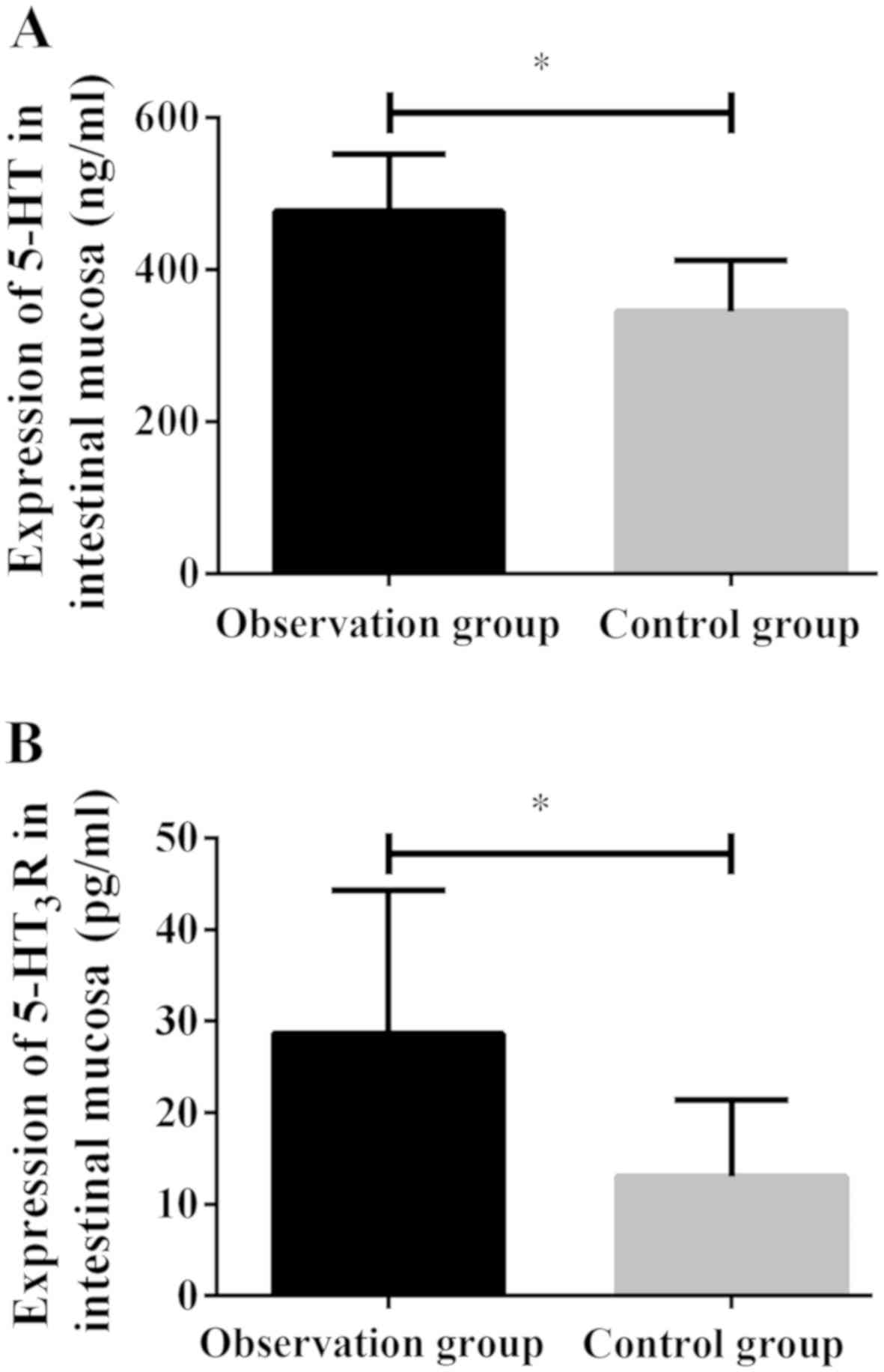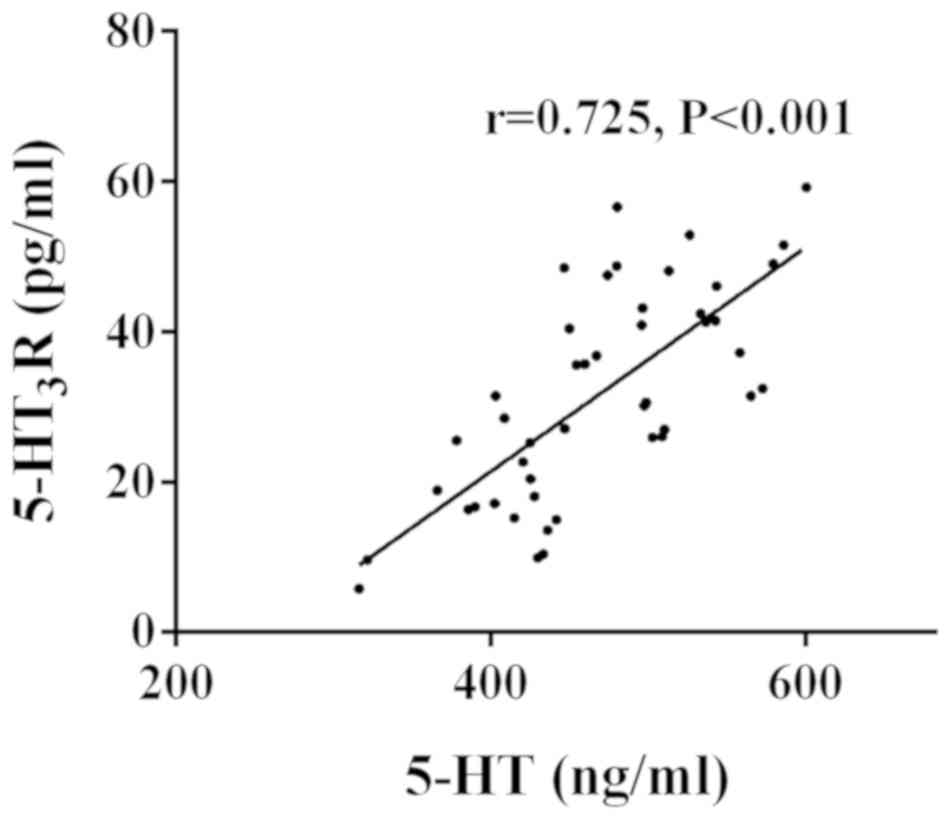|
1
|
Harper L and Bold J: An exploration into
the motivation for gluten avoidance in the absence of coeliac
disease. Gastroenterol Hepatol Bed Bench. 11:259–268.
2018.PubMed/NCBI
|
|
2
|
Fadgyas-Stanculete M, Buga AM, Popa-Wagner
A and Dumitrascu DL: The relationship between irritable bowel
syndrome and psychiatric disorders: From molecular changes to
clinical manifestations. J Mol Psychiatry. 2:4–11. 2014. View Article : Google Scholar : PubMed/NCBI
|
|
3
|
Zhao YF, Ma XQ, Wang R, Yan XY, Li ZS, Zou
DW and He J: Epidemiology of functional constipation and comparison
with constipation-predominant irritable bowel syndrome: The
Systematic Investigation of Gastrointestinal Diseases in China
(SILC). Aliment Pharmacol Ther. 34:1020–1029. 2011. View Article : Google Scholar : PubMed/NCBI
|
|
4
|
Ma XP, Hong J, An CP, Zhang D, Huang Y, Wu
HG, Zhang CH and Meeuwsen S: Acupuncture-moxibustion in treating
irritable bowel syndrome: How does it work? World J Gastroenterol.
20:6044–6054. 2014. View Article : Google Scholar : PubMed/NCBI
|
|
5
|
Lee IS, Preissl H and Enck P: How to
perform and interpret functional magnetic resonance imaging studies
in functional gastrointestinal disorders. J Neurogastroenterol
Motil. 23:197–207. 2017. View
Article : Google Scholar : PubMed/NCBI
|
|
6
|
Rajendra S and Alahuddin S: Prevalence of
irritable bowel syndrome in a multi-ethnic Asian population.
Aliment Pharmacol Ther. 19:704–706. 2004. View Article : Google Scholar : PubMed/NCBI
|
|
7
|
Harris LA, Umar SB, Baffy N and Heitkemper
MM: Irritable bowel syndrome and female patients. Gastroenterol
Clin North Am. 45:179–204. 2016. View Article : Google Scholar : PubMed/NCBI
|
|
8
|
Labus JS, Dinov ID, Jiang Z, Ashe-McNalley
C, Zamanyan A, Shi Y, Hong JY, Gupta A, Tillisch K, Ebrat B, et al:
Irritable bowel syndrome in female patients is associated with
alterations in structural brain networks. Pain. 155:137–149. 2014.
View Article : Google Scholar : PubMed/NCBI
|
|
9
|
Saha L: Irritable bowel syndrome:
Pathogenesis, diagnosis, treatment, and evidence-based medicine.
World J Gastroenterol. 20:6759–6773. 2014. View Article : Google Scholar : PubMed/NCBI
|
|
10
|
Grundmann O and Yoon SL: Complementary and
alternative medicines in irritable bowel syndrome: An integrative
view. World J Gastroenterol. 20:346–362. 2014. View Article : Google Scholar : PubMed/NCBI
|
|
11
|
Rahman MM, Mahadeva S and Ghoshal UC:
Epidemiological and clinical perspectives on irritable bowel
syndrome in India, Bangladesh and Malaysia: A review. World J
Gastroenterol. 23:6788–6801. 2017. View Article : Google Scholar : PubMed/NCBI
|
|
12
|
Crowell MD, Shetzline MA, Moses PL, Mawe
GM and Talley NJ: Enterochromaffin cells and 5-HT signaling in the
pathophysiology of disorders of gastrointestinal function. Curr
Opin Investig Drugs. 5:55–60. 2004.PubMed/NCBI
|
|
13
|
Stasi C, Bellini M, Bassotti G, Blandizzi
C and Milani S: Serotonin receptors and their role in the
pathophysiology and therapy of irritable bowel syndrome. Tech
Coloproctol. 18:613–621. 2014. View Article : Google Scholar : PubMed/NCBI
|
|
14
|
Glatzle J, Sternini C, Robin C, Zittel TT,
Wong H, Reeve JR Jr and Raybould HE: Expression of 5-HT3 receptors
in the rat gastrointestinal tract. Gastroenterology. 123:217–226.
2002. View Article : Google Scholar : PubMed/NCBI
|
|
15
|
Crowell MD: Role of serotonin in the
pathophysiology of the irritable bowel syndrome. Br J Pharmacol.
141:1285–1293. 2004. View Article : Google Scholar : PubMed/NCBI
|
|
16
|
Wang LH, Fang XC and Pan GZ: Bacillary
dysentery as a causative factor of irritable bowel syndrome and its
pathogenesis. Gut. 53:1096–1101. 2004. View Article : Google Scholar : PubMed/NCBI
|
|
17
|
Mawe GM, Coates MD and Moses PL: Review
article: Intestinal serotonin signalling in irritable bowel
syndrome. Aliment Pharmacol Ther. 23:1067–1076. 2006. View Article : Google Scholar : PubMed/NCBI
|
|
18
|
Wang Y, Wu Z, Qiao H and Zhang Y: A
genetic association study of single nucleotide polymorphisms in
GNβ3 and COMT in elderly patients with irritable bowel syndrome.
Med Sci Monit. 20:1246–1254. 2014. View Article : Google Scholar : PubMed/NCBI
|
|
19
|
Endo Y, Shoji T and Fukudo S: Epidemiology
of irritable bowel syndrome. Ann Gastroenterol. 28:158–159.
2015.PubMed/NCBI
|
|
20
|
Luscombe FA: Health-related quality of
life and associated psychosocial factors in irritable bowel
syndrome: A review. Qual Life Res. 9:161–176. 2000. View Article : Google Scholar : PubMed/NCBI
|
|
21
|
Salaga M, Binienda A, Tichkule RB, Thakur
GA, Makriyannis A, Storr M and Fichna J: The novel peripherally
active cannabinoid type 1 and serotonin type 3 receptor agonist
AM9405 inhibits gastrointestinal motility and reduces abdominal
pain in mouse models mimicking irritable bowel syndrome. Eur J
Pharmacol. 836:34–43. 2018. View Article : Google Scholar : PubMed/NCBI
|
|
22
|
Choung RS, Locke GR III, Zinsmeister AR,
Schleck CD and Talley NJ: Psychosocial distress and somatic
symptoms in community subjects with irritable bowel syndrome: A
psychological component is the rule. Am J Gastroenterol.
104:1772–1779. 2009. View Article : Google Scholar : PubMed/NCBI
|
|
23
|
Chiba T, Yamamoto K, Sato S and Suzuki K:
Long-term efficacy and safety of ramosetron in the treatment of
diarrhea-predominant irritable bowel syndrome. Clin Exp
Gastroenterol. 6:123–128. 2013. View Article : Google Scholar : PubMed/NCBI
|
|
24
|
Zhou Y, Zhou H and Liu B: Current status
of study on 5-HT in the pathogenesis of irritable bowel syndrome.
Chin J Gastroenterol. 16:445–448. 2011.(In Chinese).
|
|
25
|
Lee OY: Asian motility studies in
irritable bowel syndrome. J Neurogastroenterol Motil. 16:120–130.
2010. View Article : Google Scholar : PubMed/NCBI
|
|
26
|
Kapeller J, Houghton LA, Mönnikes H,
Walstab J, Möller D, Bönisch H, Burwinkel B, Autschbach F, Funke B,
Lasitschka F, et al: First evidence for an association of a
functional variant in the microRNA-510 target site of the serotonin
receptor-type 3E gene with diarrhea predominant irritable bowel
syndrome. Hum Mol Genet. 17:2967–2977. 2008. View Article : Google Scholar : PubMed/NCBI
|
|
27
|
Andresen V and Hollerbach S: Reassessing
the benefits and risks of alosetron: What is its place in the
treatment of irritable bowel syndrome? Drug Saf. 27:283–292. 2004.
View Article : Google Scholar : PubMed/NCBI
|
|
28
|
Sun J, Wu X, Meng Y, Cheng J, Ning H, Peng
Y, Pei L and Zhang W: Electro-acupuncture decreases 5-HT, CGRP and
increases NPY in the brain-gut axis in two rat models of
Diarrhea-predominant irritable bowel syndrome (D-IBS). BMC
Complement Altern Med. 15:3402015. View Article : Google Scholar : PubMed/NCBI
|
|
29
|
Ford AC, Brandt LJ, Young C, Chey WD,
Foxx-Orenstein AE and Moayyedi P: Efficacy of 5-HT3 antagonists and
5-HT4 agonists in irritable bowel syndrome: Systematic review and
meta-analysis. Am J Gastroenterol. 104:1831–1843. 2009. View Article : Google Scholar : PubMed/NCBI
|
|
30
|
Houghton LA, Foster JM and Whorwell PJ:
Alosetron, a 5-HT3 receptor antagonist, delays colonic transit
inpatients with irritable bowel syndrome and healthy volunteers.
Aliment Pharmacol Ther. 14:775–782. 2000. View Article : Google Scholar : PubMed/NCBI
|
|
31
|
Talley NJ: Review article:
5-hydroxytryptamine agonists and antagonists in the modulation of
gastrointestinal motility and sensation: clinical implications.
Aliment Pharmacol Ther. 6:273–289. 1992. View Article : Google Scholar : PubMed/NCBI
|
|
32
|
Spiller RC: Targeting the 5-HT(3) receptor
in the treatment of irritable bowel syndrome. Curr Opin Pharmacol.
11:68–74. 2011. View Article : Google Scholar : PubMed/NCBI
|
|
33
|
Thompson WG, Irvine EJ, Pare P, Ferrazzi S
and Rance L: Functional gastrointestinal disorders in Canada: First
population-based survey using Rome II criteria with suggestions for
improving the questionnaire. Dig Dis Sci. 47:225–235. 2002.
View Article : Google Scholar : PubMed/NCBI
|
|
34
|
Qin HY, Cheng CW, Tang XD and Bian ZX:
Impact of psychological stress on irritable bowel syndrome. World J
Gastroenterol. 20:14126–14131. 2014. View Article : Google Scholar : PubMed/NCBI
|
|
35
|
Jarcho JM, Chang L, Berman M, Suyenobu B,
Naliboff BD, Lieberman MD, Ameen VZ, Mandelkern MA and Mayer EA:
Neural and psychological predictors of treatment response in
irritable bowel syndrome patients with a 5-HT3 receptor antagonist:
A pilot study. Aliment Pharmacol Ther. 28:344–352. 2008. View Article : Google Scholar : PubMed/NCBI
|
|
36
|
Han SH, Lee OY, Bae SC, Lee SH, Chang YK,
Yang SY, Yoon BC, Choi HS, Hahm JS, Lee MH, et al: Prevalence of
irritable bowel syndrome in Korea: Population-based survey using
the Rome II criteria. J Gastroenterol Hepatol. 21:1687–1692. 2006.
View Article : Google Scholar : PubMed/NCBI
|
|
37
|
Mulak A, Taché Y and Larauche M: Sex
hormones in the modulation of irritable bowel syndrome. World J
Gastroenterol. 20:2433–2448. 2014. View Article : Google Scholar : PubMed/NCBI
|
















